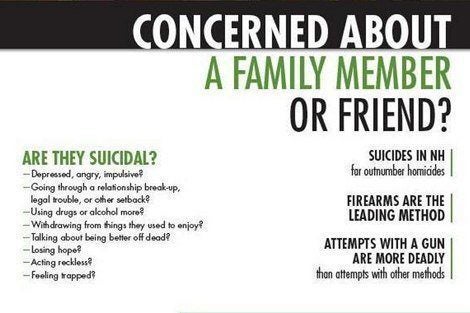For immediate release: October 30, 2014
Boston, MA — Nearly half (48%) of firearm retailers in New Hampshire displayed materials from a firearm suicide prevention campaign generated by a coalition of gun owners and public health professionals, according to a new study led by Harvard School of Public Health (HSPH) researchers. It is the first collaboration between firearm retailers and public health professionals around suicide prevention.
The study appeared online October 28, 2014 in Suicide and Life-Threatening Behavior.
Following a spate of suicides in 2009 in New Hampshire involving recently-purchased firearms, the New Hampshire Firearm Safety Coalition initiated a study of the problem and discussed ways in which it could be addressed. Composed of firearms retailers, other firearms rights advocates, and suicide prevention experts, the coalition identified all commercial firearm retailers in the state and conducted structured interviews to discuss the role of firearm access in suicide prevention and obtain input on draft campaign materials. Packets of final campaign materials for both firearm retailers (providing tips to reduce the odds of selling a firearm to someone who may be suicidal) and their customers (encouraging customers to consider off-site storage if someone at home is suicidal) were mailed to all firearm retailers, and stores were visited unannounced six months later to assess their response to the packets.
“We were quite pleasantly surprised to discover so many stores had the materials we developed for their customers on display,” said lead author Mary Vriniotis, who conducted this work while at Harvard School of Public Health and is now a researcher at the American Institutes for Research in Washington D.C. “I knew from conducting many of the interviews while developing materials that retailers were very thoughtful about this issue, but conveying a message to one’s customers indicates a willingness to put thought into action.”
The only factor identified in the study that was related to a store’s likelihood of displaying campaign materials was the owner’s belief that reducing a suicidal person’s access to firearms could save a life: 69% of those who believed this displayed campaign materials, whereas only 41% of retailers who did not believe this displayed these materials.
“I’d hate to think a gun I sold was used in a suicide, and others feel the same way,” said study co-author Ralph Demicco, former owner of Riley’s Sports Shop in Hooksett, NH and co-chair of the coalition. “That’s why we’re learning about warning signs and spreading an additional message of gun safety to our customers: If you’re worried someone is suicidal, offer to hold on to their guns until they are in a better place.”
“This coalition demonstrates that there is common ground and even overlap between the gun-owning community and the public health community,” said study co-author Elaine Frank, co-chair of the coalition and director of a program at Dartmouth College to counsel health care professionals on reducing a suicidal person’s access to lethal means. “Legislative approaches to improving firearm safety tend to get stuck, but when an atmosphere of respect is cultivated around a shared goal, it is possible to avoid polarizing debate even around a subject as contentious as firearms—not only possible, but critical if progress in saving lives is to be made. We are pleased that this project is now being replicated in multiple states around the country.”
Catherine Barber of the Harvard Injury Control Research Center at HSPH was a co-author.
This study was supported by funding from Riley’s Sport Shop Inc., the NH Department of Health and Human Services’ Bureau of Behavioral Health, the Joyce Foundation, the Bohnett Foundation, the NH Chapter of the National Alliance on Mental Illness, and the Injury Prevention Center at Dartmouth University.
“A Suicide Prevention Campaign for Firearm Dealers in New Hampshire,” Mary Vriniotis, Catherine Barber, Elaine Frank, Ralph Demicco, and the New Hampshire Firearm Safety Coalition, Suicide and Life-Threatening Behavior, online October 28, 2014, DOI: 10.1111/sltb.12123
For more information:
Todd Datz
tdatz@hsph.harvard.edu
617-432-8413
###
Harvard School of Public Health brings together dedicated experts from many disciplines to educate new generations of global health leaders and produce powerful ideas that improve the lives and health of people everywhere. As a community of leading scientists, educators, and students, we work together to take innovative ideas from the laboratory to people’s lives—not only making scientific breakthroughs, but also working to change individual behaviors, public policies, and health care practices. Each year, more than 400 faculty members at HSPH teach 1,000-plus full-time students from around the world and train thousands more through online and executive education courses. Founded in 1913 as the Harvard-MIT School of Health Officers, the School is recognized as America’s oldest professional training program in public health.
